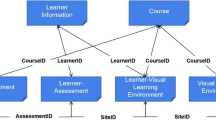Abstract
In college students’ English learning, it is undeniable that non intelligence factors can significantly influence their English learning achievement. This paper studies the influence of non intelligence factors on English learning achievement of college students. Decision tree algorithm is used to construct decision tree for factors influencing of college students’ English learning, which is further modified through C4.5 algorithm according to the actual situation, and the non intelligence factors influencing college English learning achievement are obtained. Finally, the conclusion is further tested, and the test results indicate that the prediction rule can accurately predict the English learning achievement of average students and underachievers. Therefore, the proposed algorithm can be used as a good predictor for students with average or poor English learning achievement and meet the requirement of teaching assistance.


Similar content being viewed by others
References
Haney, B. D. (2015). Assessing organizational readiness for E-learning: 70 questions to ask. Performance Improvement, 41(4), 10–15.
Sandhawalia, B. S., & Dalcher, D. (2015). Dynamic knowledge support model for decision-making and sustainable growth: An empirical study. Group Decision and Negotiation, 24(5), 1–21.
Labib, S., Williams, A., Guo, C. H., et al. (2016). Comparative transcriptomic analyses to scrutinize the assumption that genotoxic PAHs exert effects via a common mode of action. Archives of Toxicology, 90(10), 1–20.
Dryer, R., Henning, M. A., Tyson, G. A., et al. (2016). Academic achievement performance of university students with disability: Exploring the influence of non-academic factors. International Journal of Disability Development & Education, 63(4), 1–12.
Hegedus, S. J., Tapper, J., & Dalton, S. (2016). Exploring how teacher-related factors relate to student achievement in learning advanced algebra in technology-enhanced classrooms. Journal of Mathematics Teacher Education, 19(1), 7–32.
Cho, H. (2016). Relationship between college students’ English learning beliefs and their English achievement in e-learning. Journal of Digital Convergence, 14(11), 53–61.
Yang, X. (2017). Dynamic assessment in english pronunciation teaching: From the perspective of intellectual factors. Theory & Practice in Language Studies, 7(9), 780.
Funding
Funding was provided by Research on English teaching combining Ubiquitous Learning and Micro-class (Grant No. JXJG-16-80-1).
Author information
Authors and Affiliations
Corresponding author
Rights and permissions
About this article
Cite this article
Li, M. A Study on the Influence of Non-intelligence Factors on College Students’ English Learning Achievement Based on C4.5 Algorithm of Decision Tree. Wireless Pers Commun 102, 1213–1222 (2018). https://doi.org/10.1007/s11277-017-5177-0
Published:
Issue Date:
DOI: https://doi.org/10.1007/s11277-017-5177-0




